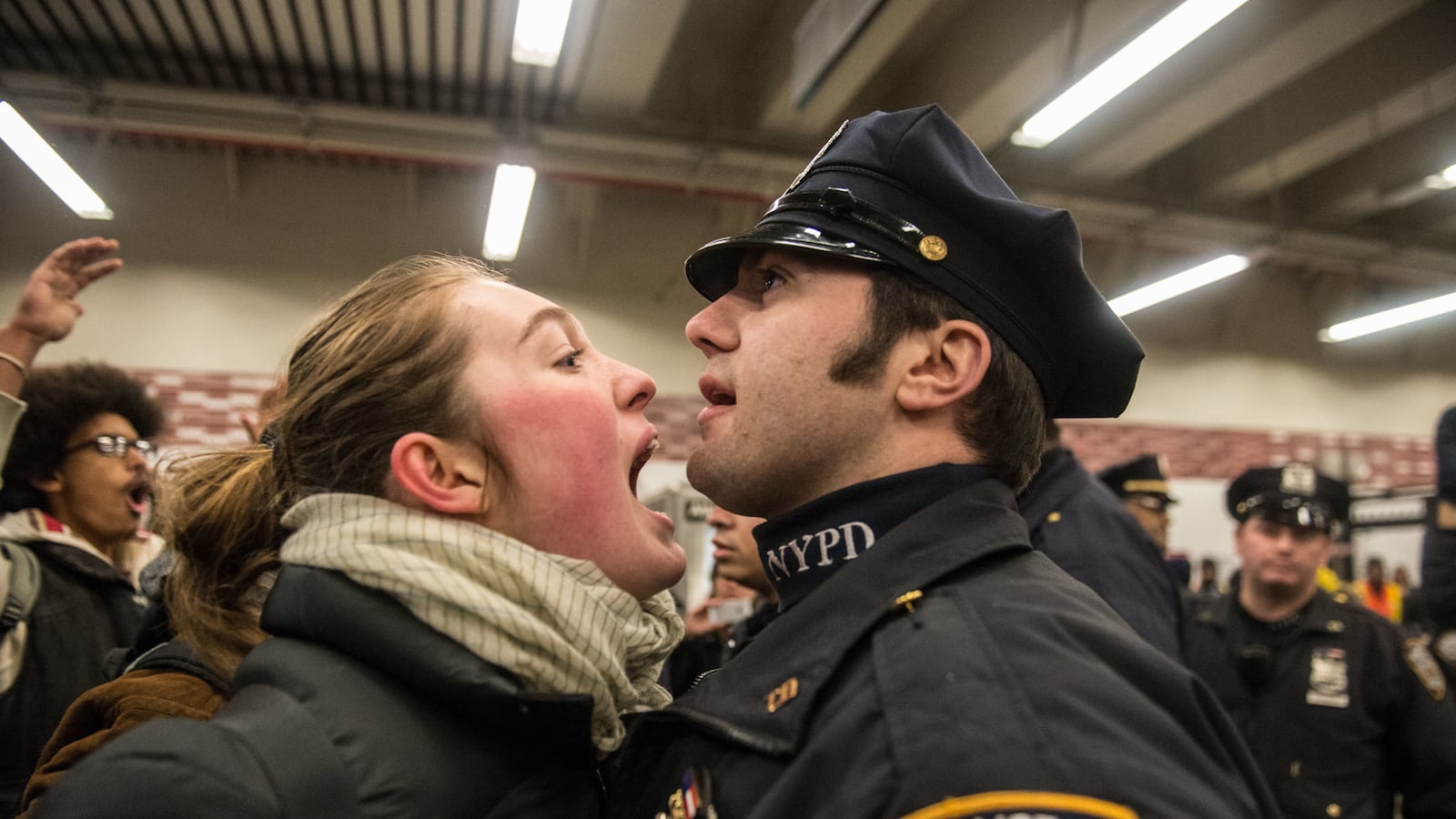In recent months, thousands of people from all walks of life have flooded the streets of our cities. No matter what you believe about these protests, there is beauty in watching diverse groups of people—black and white, alike—come together in the name of racial equality. Yes, some people have been inconvenienced by traffic delays or annoyed by supportive athletes. But even they should see the marches as expressions of our best and highest ideals.
Unfortunately, those demonstrations have also exposed a disturbing truth—that even among those bound together in the quest for social justice, unexamined privilege is prevalent.
The best example of this came in the form of a single photograph, published by the New York Daily News, of a 20-something white woman standing fearlessly, pressed breasts-to-chest with a New York City police officer. From her expression, we know she is passionately shouting in unchecked defiance as another officer looks on passively from a few paces away. Neither seems bothered that she is in his face. Neither is unnerved by her apparent anger, nor do they see her as threatening.
Like most of the protesters, maybe she’s challenging the belief that equal protection is a reality, or maybe she is demanding that the justice system end over-policing in black neighborhoods, dismantle mass incarceration, and end the school-to-prison pipeline. Maybe, she—like me—is frustrated that two separate grand juries, in two different states, failed to hold police officers accountable in the deaths of two African American men. Maybe (and I amuse myself) she’s shouting: Black lives matter!
My amusement doesn’t last.
I know I cannot be the woman in that photograph. I cannot be indignant, no matter how righteous my fury. And even if I were inclined, I couldn’t shout at a police officer—not in his face, not from across the street. I couldn’t grip my waist and jam my chest against his. “I would not make it home,” I tweeted a few nights ago.
The truth is while I don’t know what she was saying, I do know this: Similar actions by a person of color, specifically a black woman like me, would likely end up with us in jail, in a hospital or who knows—like Eric Garner, on a medical examiner’s table.
I know that I cannot carry a gun in public and neither can my sons, even if it is a toy. If I lay prone on an open highway and point an assault rifle at a federal agent, my next stop would be federal custody or the nearest county morgue. Open carry laws are not meant for me. The rules are different. It’s what it means to be black in this country.
When you look at that photo, think of Garner. His hands outstretched, shoulders in submission, there was no shouting, no expletives, no aggression at all. He was not selling “loosies” that day, no cigarettes were found on his person, and thus there was no probable cause in play. He was not under arrest, because he had done nothing. Garner believed that he could stand on a public street, unarmed, and address police officers rationally.
He was wrong.
In stark terms, that is privilege. That is the difference between the protections embedded in our Bill of Rights and the lived lives of our citizenry. The rule of law, you see, buckles, bends and sometimes crumbles under the weight of racism, sexism, and classism. Whether I am a victim or a suspect, how much justice I can access is largely dependent upon the societal categories in which I reside.
You can’t earn it and you can’t discard it. There is no “coat check” for privilege. And it often travels so lightly that you can forget you are clothed in its benefits. Merely mention the word privilege, specifically white privilege, anywhere in the public square—including on social media—and one is likely to be mocked, as I was as soon as I reposted the photograph. The mockery comes from a place unburdened by history and untouched by the present. Most people, however, understood the significance of the photo immediately-- especially those who share my skin.
I am terrified to imagine what would happen to one of my four grown children, three of whom are also in their 20s, if they found themselves in a similar position. I cried and then I prayed before giving each of them some variation of the coming-of-age chat that has become a tradition in most African American households. Thankfully, they are well-mannered, law-abiding people. Still, I worry that a simple traffic stop could have tragic consequences.
My younger, straighter-than-an-arrow son was stopped and arrested in two separate jurisdictions a few years ago. During the first stop, not more than 10 miles from our home, my then 19-year-old son was cited for a shining his high beams on a darkened highway, and on a trumped-up curfew violation because his driver’s license had not been updated. The arresting officer identified him a “black” on the paperwork. While the desk sergeant ran a background check, he was roughed up by another officer in the lock-up.
With no record and no warrants, he was given a four-figure bond by a judge the next morning. It cost several thousand dollars and a high-powered former district attorney to get the charges dropped.
The second stop for speeding happened in another state a year later. Ironically, it was in a county that I knew all too well. My paternal great grandfather had grown up there. The area is 98 percent white, and the Klan has a strong foothold even to this very day.
That officer believed my fair-skinned son was white, according to the traffic citation I examined. Rather than face time in a jail cell and post a bond, as is customary for out-of-state drivers, my son was politely taken to the sheriff’s office and allowed to call his parents. Unable to reach us immediately, he hung out in the office joking with deputies until I picked up the phone with an obligatory “code-switched” voice. He was released within the hour without a bond on his own recognizance.
The reality is none of us are truly colorblind. Having a badge does not erode one’s propensity toward racial bias nor does it preclude any actions informed by it. If anything, officer training and in-field policing methodologies reinforce those beliefs. It is that predilection toward suspicion of black males that drives an officer to see my sons as older and more prone to criminality than their white counterparts. In the most extreme cases, it allows for the extrajudicial killing of black people without consequence.
Conservatives, and many liberals, fight with that truth. But the fact of the matter is the equal protection they cling to is not the reality. To the contrary, it remains a virtue to which this country aspires, but it’s one that only some of us can embrace.






